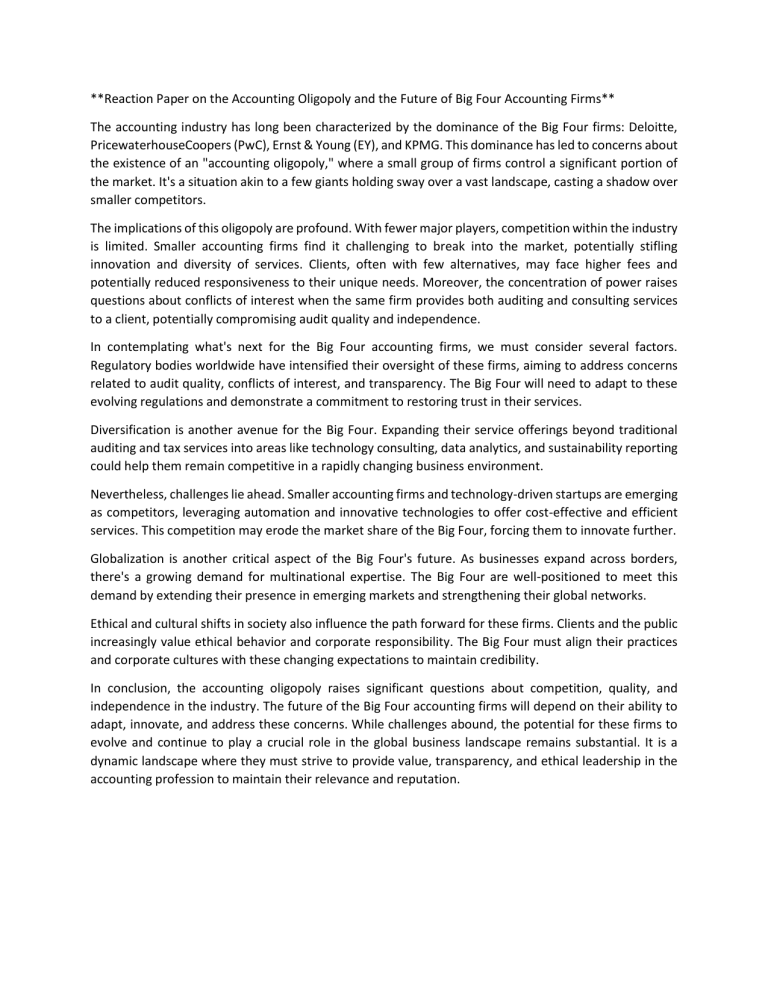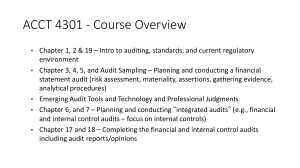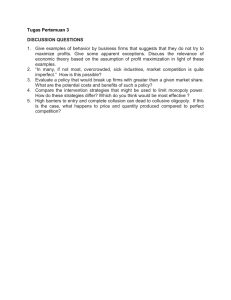
**Reaction Paper on the Accounting Oligopoly and the Future of Big Four Accounting Firms** The accounting industry has long been characterized by the dominance of the Big Four firms: Deloitte, PricewaterhouseCoopers (PwC), Ernst & Young (EY), and KPMG. This dominance has led to concerns about the existence of an "accounting oligopoly," where a small group of firms control a significant portion of the market. It's a situation akin to a few giants holding sway over a vast landscape, casting a shadow over smaller competitors. The implications of this oligopoly are profound. With fewer major players, competition within the industry is limited. Smaller accounting firms find it challenging to break into the market, potentially stifling innovation and diversity of services. Clients, often with few alternatives, may face higher fees and potentially reduced responsiveness to their unique needs. Moreover, the concentration of power raises questions about conflicts of interest when the same firm provides both auditing and consulting services to a client, potentially compromising audit quality and independence. In contemplating what's next for the Big Four accounting firms, we must consider several factors. Regulatory bodies worldwide have intensified their oversight of these firms, aiming to address concerns related to audit quality, conflicts of interest, and transparency. The Big Four will need to adapt to these evolving regulations and demonstrate a commitment to restoring trust in their services. Diversification is another avenue for the Big Four. Expanding their service offerings beyond traditional auditing and tax services into areas like technology consulting, data analytics, and sustainability reporting could help them remain competitive in a rapidly changing business environment. Nevertheless, challenges lie ahead. Smaller accounting firms and technology-driven startups are emerging as competitors, leveraging automation and innovative technologies to offer cost-effective and efficient services. This competition may erode the market share of the Big Four, forcing them to innovate further. Globalization is another critical aspect of the Big Four's future. As businesses expand across borders, there's a growing demand for multinational expertise. The Big Four are well-positioned to meet this demand by extending their presence in emerging markets and strengthening their global networks. Ethical and cultural shifts in society also influence the path forward for these firms. Clients and the public increasingly value ethical behavior and corporate responsibility. The Big Four must align their practices and corporate cultures with these changing expectations to maintain credibility. In conclusion, the accounting oligopoly raises significant questions about competition, quality, and independence in the industry. The future of the Big Four accounting firms will depend on their ability to adapt, innovate, and address these concerns. While challenges abound, the potential for these firms to evolve and continue to play a crucial role in the global business landscape remains substantial. It is a dynamic landscape where they must strive to provide value, transparency, and ethical leadership in the accounting profession to maintain their relevance and reputation. The evolving landscape of the accounting industry, as portrayed in the given text, underscores the complex interplay between audit firms, their role in financial markets, and the need for regulatory scrutiny. The dominance of the Big Four accounting firms—KPMG, PWC, EY, and Deloitte—has facilitated their influence in financial reporting and auditing services for major corporations. However, this dominance has been met with growing concerns surrounding conflicts of interest and the potential compromise of audit integrity. The historical narrative, with examples like Enron and Arthur Andersen's downfall, highlights the catastrophic consequences of such conflicts. These incidents prompted the emergence of the Big Four through mergers, as the industry consolidated for stability and credibility. Yet, as the Big Four's power increased, so did scrutiny over their ability to detect fraud and maintain audit objectivity. Notably, several subsequent accounting scandals involving the Big Four demonstrate the persistent challenges in ensuring reliable financial reporting and accurate audits. A core concern is the extensive reliance of these firms on non-audit services, such as consulting and advisory work, which can potentially influence their independence in conducting audits. Critics argue that the substantial revenues generated from these non-audit services create an incentive for audit firms to prioritize their consultancy work over the integrity of their audits. This inherent conflict threatens the effectiveness of audits as a safeguard for investor confidence. Regulatory efforts to address these issues have resulted in measures like the Sarbanes-Oxley Act and similar legislation in different regions. While such regulations aim to maintain the independence of audits, they are not without shortcomings. The issue of "opinion shopping," where companies choose auditors likely to give favorable opinions, remains a concern. Additionally, the fact that audit firms can transition from auditing to consulting roles for the same client raises questions about the efficacy of these regulatory safeguards. The text also(it) points out that audit failures aren't always the primary means of uncovering fraud; tipoffs and whistleblowing play crucial roles. This highlights the importance of encouraging an environment where whistleblowers can come forward without fear of retaliation, thereby complementing the role of audits in detecting irregularities. The article notes the steps taken by some of the Big Four firms to address these issues, such as setting up audit governance boards and emphasizing a role in fraud detection. The imposition of deadlines for separating audit units from other services, as seen in the U.K., reflects a regulatory stance that aims to enhance audit integrity. However, the potential efficacy of these measures remains a point of debate, as the Big Four's influence on the market is deeply entrenched. In conclusion, the evolving narrative of the accounting industry, marked by the rise and consolidation of the Big Four, underscores the delicate balance between audit integrity, non-audit services, and regulatory oversight. The recurring challenges, including conflicts of interest and the struggle to maintain audit independence, highlight the need for sustained efforts to restore investor confidence. As regulatory bodies and the accounting industry continue to navigate these complex dynamics, the ultimate goal must be to ensure that audits remain a reliable cornerstone of financial markets, untainted by conflicts and capable of preserving the integrity of financial reporting. The article raises significant concerns about the dominance and practices of the Big Four accounting firms—KPMG, PwC, EY, and Deloitte—in the global financial industry. It underscores the critical role audits play in ensuring transparency and investor confidence. However, it highlights that this confidence has been eroded by a series of high-profile corporate collapses and accounting scandals, casting doubt on the effectiveness of these firms. The historical context provided, with references to Enron and Arthur Andersen, serves as a stark reminder of the devastating consequences of lax auditing practices. The subsequent consolidation of the Big Eight into the Big Four highlights the industry's trend towards oligopoly, further intensifying the need for scrutiny and competition. The article rightly emphasizes the conflict of interest inherent in the Big Four's dual roles of auditing and providing non-audit services. Critics argue that this lucrative non-audit business can compromise the independence and objectivity of audits, potentially leading to failures to detect fraud. The statistics regarding the revenue breakdown between auditing and non-audit services within these firms are particularly concerning. While the Big Four firms contend that regulations exist to safeguard the independence of their auditing services, the article points out potential weaknesses in these regulations. The fact that auditing contracts can quickly transition into consultancy work for the same client raises concerns about conflicts of interest and the willingness to challenge clients' financial practices. The response of some Big Four firms, such as Deloitte's creation of an audit governance board and EY's call for auditors to play a more proactive role in fraud detection, demonstrates a recognition of the need for change. Similarly, the UK's Financial Reporting Council's deadline for separating audit units from other services within the Big Four signifies a step in the right direction. In conclusion, the article underscores the urgent need for reform in the auditing industry. To restore public and investor confidence, it is imperative that audits remain truly independent, objective, and uncompromised. Regulatory bodies must continue to evolve and strengthen their oversight to prevent further accounting scandals and protect the integrity of financial markets. The fate of Arthur Andersen serves as a stark reminder that decisive action is required before history repeats itself in the world of accounting.


